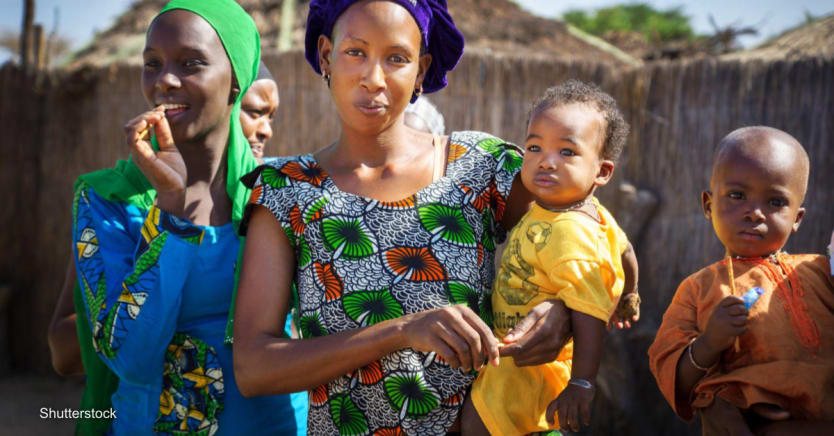
We all have mothers. At one critical point in time, their health and nutrition determined who we are today.
Good nutrition of mothers is foundational for nations. Their health and nutritional well-being through pregnancy and lactation, when nutrient needs are significant, deeply nourish the health of their babies, now and in the future.
Today, unacceptably high and largely preventable levels of maternal malnutrition across low- and middle-income countries continue to limit nations’ human capital. Two out of 3 women worldwide suffer from at least one micronutrient deficiency, and 1 in 3 pregnant women are anemic, contributing to 20% of all maternal mortality worldwide.
Maternal malnutrition sharply increases the risk of maternal death, which is three-fold higher in LMICs than the 2030 Sustainable Development Goal 3’s target of 70 maternal deaths per 100,000 live-born babies. It also dramatically compromises the survival and well-being of babies — being born too small and too soon — impairing their development in subsequent years.
Every year, 800,000 newborns die, and 1 in 7 worldwide — more than 20.5 million babies — are born weighing less than 2.5 kilograms because of poor maternal nutrition. While these statistics are alarming, even more shocking is that many of these poor pregnancy outcomes are largely preventable.
A new national agenda for mothers
Children are a country’s future and that first starts with mothers. As we strive to achieve the 2030 Agenda on Sustainable Development and global World Health Organization nutrition targets, we must invest in the nutrition of both children and their mothers. As stated by Dr. Martin Mwangi, program lead at the Healthy Mothers Healthy Babies, or HMHB, Consortium: “You are who you are today because your mother ensured that she was healthy during your stay in her womb and the immediate period after you were born. Mothers MUST be prioritized now!”
As we rally for the leaders of our nations, we must now rally for the mothers of our nations. It is ultimately a choice that has profound implications for the future.
—Elevating maternal nutrition to national agendas has never been a more winnable policy priority. Women’s nutrition and health are critical to the resilience of families and communities against shocks such as climate and food crises, conflicts, and the COVID-19 pandemic. Women are food producers, income earners, and caretakers. Their well-being is fundamental for a country.
Country leaders are called upon to make political choices for their nation’s future and invest in powerful, proven, and cost-effective maternal nutrition interventions.
To date, investments in women’s nutrition in most countries have been limited to standard protocols, including iron supplementation and nutrition counseling, as part of antenatal care services. However, too often, they have not been effective due to lack of capacity and weak implementation systems, resulting in low coverage.
One opportunity to improve antenatal care services is to introduce a new, more cost-effective intervention. UNIMMAP Multiple Micronutrient Supplements, referred to as MMS, provide 15 essential vitamins and minerals for pregnant women and is an evidence-based and cost-effective solution that improves maternal nutrition and reduces adverse birth outcomes.
Despite the breadth of evidence built over two decades, the rollout of MMS to pregnant women has remained shockingly slow — reflecting a disconnect between science, policies, and action at the global and national levels. If coverage reached 90% of all pregnant women across 132 LMICs for all babies born in one year, an estimated 5 million additional years of education and over $18 billion in cumulative lifetime income would be gained.
Sustained political prioritization is necessary to support national partners. New national agendas can be set into motion with a set of essential actions.
First, national governments should adopt MMS into their maternal health and nutrition policies. Specifically, it is recommended to include MMS in national drug lists, following the example of WHO that approved the inclusion of MMS in its Model List of Essential Medicines in 2021.
Second, governments should design MMS delivery programs to integrate into existing national nutrition services and health systems and, in line with WHO recommendations, introduce MMS in the context of rigorous implementation research. Early-adopter countries are conducting new research to address knowledge gaps on effective MMS programming, demand generation, and on ways to increase adherence to supplements.
Third, scaling up new interventions such as MMS requires coordinated action to strengthen the health system, specifically the antenatal care platform. National governments must allocate and sustain investments in health capacity building of frontline workers, strengthening information systems, routine monitoring of programs, data collection, management, and analysis to refine and course-correct programs if required.
Finally, the procurement of high-quality MMS requires investments and decisions by national authorities regarding sourcing locally manufactured or imported supplements, developing local manufacturing capacity, private sector investments and incentives, and other supply chain issues.
Collective action and collective impacts
Today, collaboration platforms are increasingly used to drive common agendas through collective action. This is particularly necessary for MMS adoption, integration, and scale-up into national systems.
“We are committed to improving the future of our mothers and look to early adopter countries to benefit from shared learning experiences on adopting MMS,” says Dr. Bibek Kumar Lal, director of family welfare in the Nepal Ministry of Health and Population.
With a unique focus on improving maternal nutrition, notably through the implementation of MMS, the HMHB Consortium, hosted by the Micronutrient Forum, brings government authorities together with scientists, experts, and the private sector to address gaps and drive solutions. The Consortium is accelerating its partnerships with national leaders to strengthen maternal nutrition agendas through robust advocacy and knowledge brokering.
As we rally for the leaders of our nations, we must now rally for the mothers of our nations. It is ultimately a choice that has profound implications for the future.
Become a member of the Healthy Mothers Healthy Babies Consortium to support collective action on maternal nutrition.









